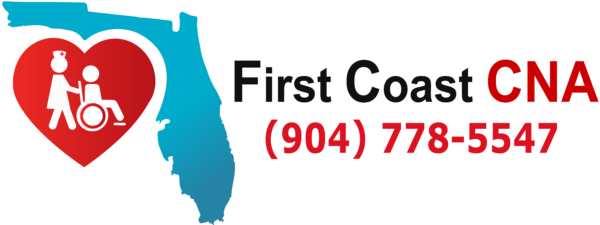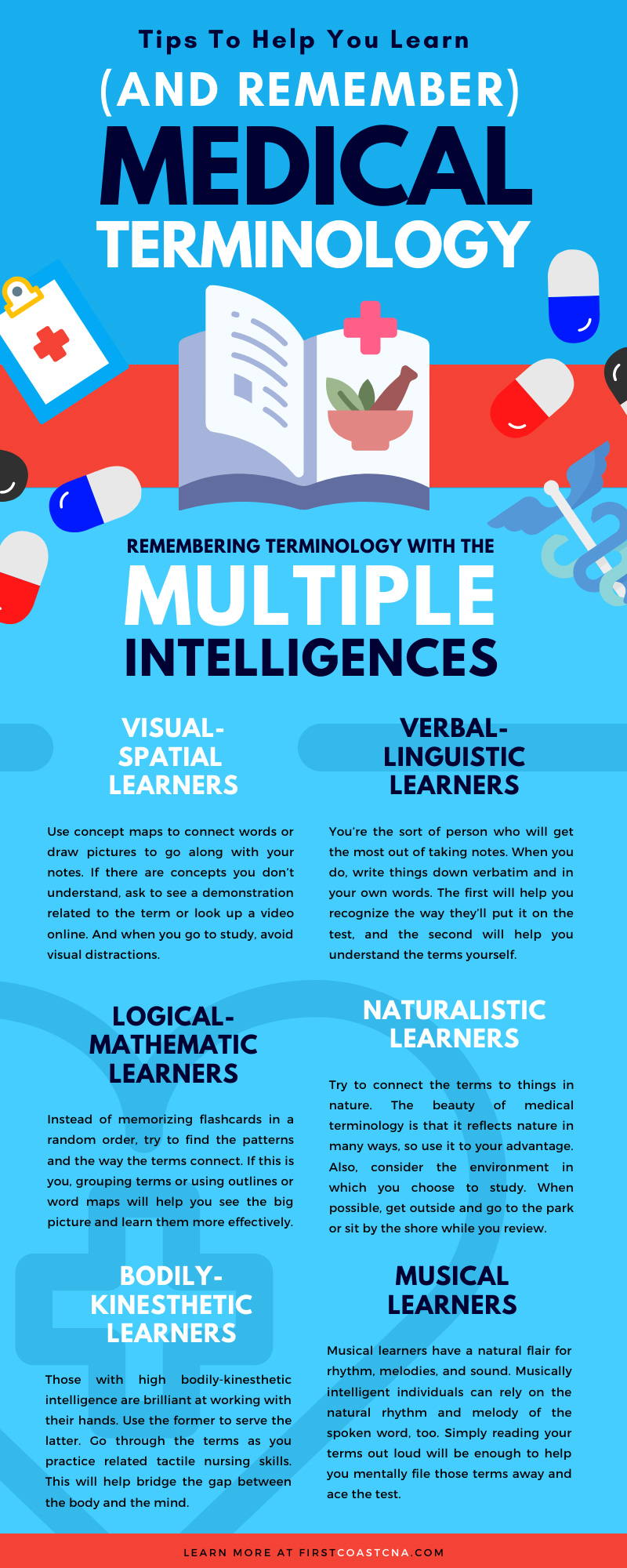The human body is a vastly complicated structure. Just look at the nervous system; there are over seven trillion nerves. If you aren’t a fan of memorizing medical terms, the written portion of your Florida Prometric CNA Exam has probably gotten on every last one of them.
If the idea of remembering all those terms has ever made you want to sit in a corner and cry, don’t despair. We’re all capable of memorizing things, even the terms related to that beautiful, complicated arrangement that is the human body. It’s all a matter of finding the strategy that works best for you. Here are some essential tips to help you learn (and remember) medical terminology.
Why Memorize as a CNA?
Before we get into the tips themselves, let’s answer a question that is probably on your mind. Why even bother? After all, being a CNA is about action, not dense knowledge. When you’re on the job, people are probably not going to stand around asking you to define intubation. Besides, you’ll be able to look everything up by that point. Beyond the obvious reason of that big bad test, there’s real value in learning and remembering key medical terminology. A few reasons include:
- It will help you understand doctors and nurses in hospital settings.
- Foundational medical knowledge will help you recognize medical problems.
- It will enable you to explain medical issues to patients and their family members.
- If you want to go on to be an RN, you’ll have a head start.
- Memorizing things is beneficial for your brain.
Obviously, learning this information is the key to getting your foot in the door. But recognizing that there is a deeper value in learning this information will help your mind be more receptive to learning it.
Remembering Terminology With the Multiple Intelligences
If you asked most people to imagine a “smart” person, they would probably visualize a scientist in a lab coat or a professor standing in front of a dusty bookshelf. While these individuals undoubtedly have plenty of intellect, they only represent two ways to be “smart.” According to psychologist Howard Gardner, there are nine different types of intelligence, or ways people learn and demonstrate information. If you know which intelligences you’re strong in, you can build a learning strategy. Here are some strategies for the main varieties of learners.
Visual-Spatial Learners
As the name suggests, those with high visual-spatial intelligence are excellent at perceiving and interpreting the visual world around them. They are gifted at puzzles, interpreting graphs and charts, or creating artwork. If you’re this type of learner, make the most of visual aids as you study terminology. Use concept maps to connect words or draw pictures to go along with your notes. If there are concepts you don’t understand, ask to see a demonstration related to the term or look up a video online. And when you go to study, avoid visual distractions.
Verbal-Linguistic Learners
These are the “word smart” learners. These are people who are drawn to language, who loved literature class, and thrive when they can journal about or verbally process information. Since you love words anyway, learning terminology will likely come easiest to you as a word smart person. You’re the sort of person who will get the most out of taking notes. When you do, write things down verbatim and in your own words. The first will help you recognize the way they’ll put it on the test, and the second will help you understand the terms yourself.
Logical-Mathematic Learners
The term “logical mathematic learner” belies a proclivity for algebra or geometry. Although these people are most likely to enjoy some good old-fashioned factoring or proofs, the keyword for these learners is logic. They’re the detectives and the problem solvers, the ones who make connections and see patterns. Instead of memorizing flashcards in a random order, try to find the patterns and the way the terms connect. If this is you, grouping terms or using outlines or word maps will help you see the big picture and learn them more effectively.
Interpersonal Learners
If you’re a “people person,” chances are you’re also an interpersonal learner. These are people who thrive when they’re communicating with and working with other people, which is a great skill to have as a CNA. The best way to learn terminology as an interpersonal learner is to find the other interpersonal learners in your class and band together. Take turns teaching each other the words and concepts. And if you can’t find fellow prospective CNAs, teach the terms to other people in your life, whether it’s a parent, sibling, or spouse.
Intrapersonal Learners
The prefix “intra” means “within.” Intrapersonal learners are most comfortable with the world within themselves. These are deep thinkers and self-motivated workers. They’re often very creative and in tune with their thoughts and feelings. As cheesy as it sounds, it’s a good idea to make a personal connection with every term. If you can create a mnemonic connecting a term with an experience you’ve had or a story you like, you’ll easily remember the term.
Naturalistic Learners
Those with a naturalistic learning style are—you guessed it—in tune with nature. They love being outside, interacting with animals, or working with plants. Take a cue from the intrapersonal learners and try to connect the terms to things in nature. The beauty of medical terminology is that it reflects nature in many ways, so use it to your advantage. Also, consider the environment in which you choose to study. When possible, get outside and go to the park or sit by the shore while you review.
Bodily-Kinesthetic Learners
Those with high bodily-kinesthetic intelligence are brilliant at working with their hands. If this sounds like you, you’re probably excited about the performance part of the exam and not so much about the written portion. Use the former to serve the latter. Go through the terms as you practice related tactile nursing skills. This will help bridge the gap between the body and the mind. And don’t be afraid to come up with hand gestures to help you remember your terms.
Musical Learners
The name of these learners speaks for itself. Musical learners have a natural flair for rhythm, melodies, and sound. And that last word is key. You can compose a mnemonic ditty to help you remember all your terms. Musically intelligent individuals can rely on the natural rhythm and melody of the spoken word, too. Simply reading your terms out loud will be enough to help you mentally file those terms away and ace the test.

